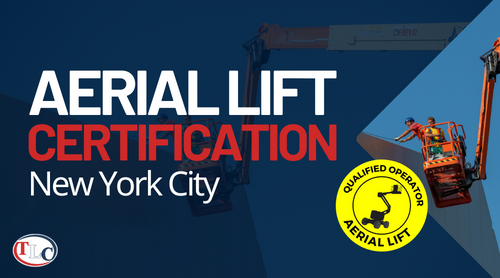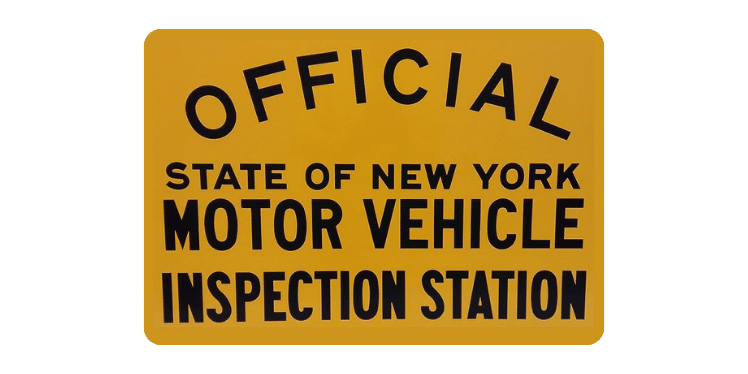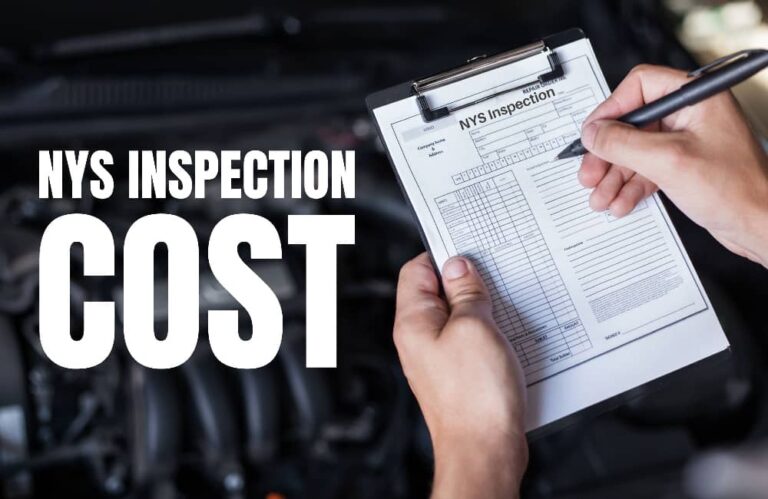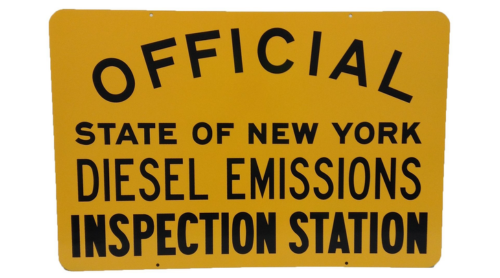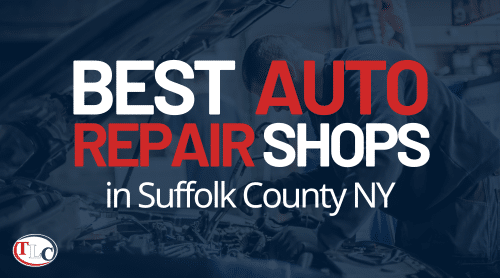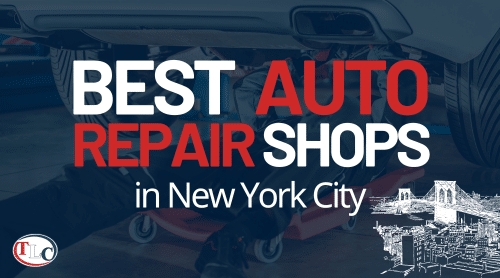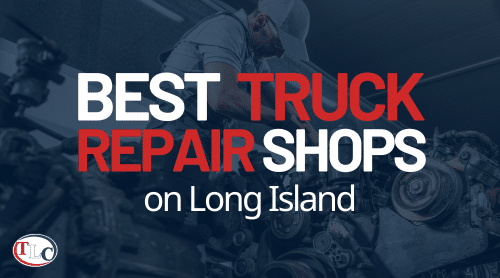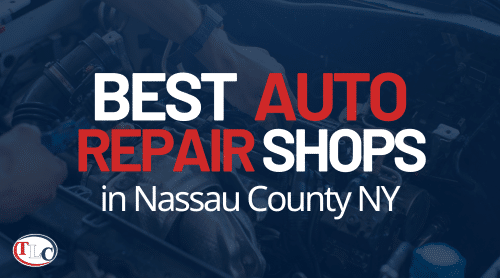Aerial Lift Certification in NYC
This guide will help you understand how to get the certification needed for operators and employers in New York City. Understanding and following the certification process is very important for safety and legality in the city’s busy construction and maintenance industries.
Legal Requirements for Aerial Lift Operators in NYC
Using aerial lifts in NYC requires skill, knowledge, and following OSHA and local regulations for safety. Understanding these requirements is crucial for ensuring safety, compliance, and the avoidance of legal issues.
Here’s a breakdown of the key legal requirements for aerial lift operators in NYC:
OSHA Standards for Aerial Lifts
OSHA’s guidelines for aerial lift operations are designed to protect workers from the risks associated with using these machines. These standards include, but are not limited to:
- Training and Certification: OSHA requires that all aerial lift operators be trained and certified to operate the equipment. This training must cover the model-specific operations of the lift, safety procedures, and hazard recognition.
- Fall Protection: Workers must wear a body harness or restraining belt. The harness or belt should have a lanyard attached to the boom or basket. This is to prevent workers from falling. OSHA’s fall protection standards are critical for ensuring the safety of operators working at heights.
- Inspection and Maintenance: Aerial lifts must be inspected for problems that could be dangerous before each use. Regular maintenance according to the manufacturer’s guidelines is also required to ensure the equipment remains in safe working condition.
- Safe Operation: OSHA mandates that lifts be operated in accordance with the maker’s instructions. This includes adhering to load capacity limits, operating speed, and environmental conditions suitable for safe operation.
Local NYC Safety Regulations
In addition to OSHA standards, aerial lift operators in NYC must comply with local safety regulations, which may include:
- Permits and Licenses: Operators must have permits or licenses to use aerial lifts in certain parts of the city. The need for permits or licenses depends on the area and type of work being done.
- Traffic Control Measures: When operating an aerial lift in or near public roadways, operators must follow local traffic control measures to ensure the safety of pedestrians, drivers, and workers. This may include setting up barriers, signs, and having a spotter to direct traffic.
- Noise Regulations: In NYC, there are strict rules about noise. Operators must make sure that aerial lifts are not too loud, especially in residential areas or at night.
Ensuring Compliance
To ensure compliance with both OSHA standards and local NYC regulations, operators and employers should:
- Keep Updated on Regulations: Regularly review OSHA standards and local regulations as they can be updated or changed. Staying informed is key to maintaining compliance.
- Document Training and Certification: Maintain records of all training and certifications for aerial lift operators. This documentation is crucial in the event of an inspection or accident.
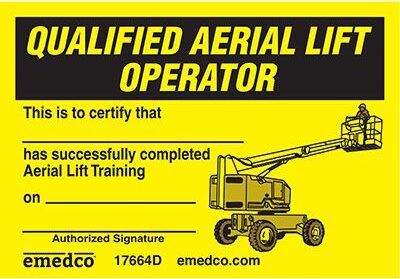
Source: emedco.com
- Conduct Regular Safety Meetings: Hold safety meetings to discuss potential hazards, recent incidents, and reminders about operating procedures. This fosters a culture of safety and compliance among the workforce.
Following these legal requirements not only ensures the safety of aerial lift operators and those around them but also protects employers from potential fines and legal liabilities. Getting certified for aerial lifts in NYC is important for safety on construction sites. It’s required by law and helps make work environments safer for everyone involved.
How to Obtain Aerial Lift Certification in NYC
Obtaining aerial lift certification involves a clear process, starting with choosing an accredited training program. These programs offer both theoretical knowledge and practical skills, culminating in an examination that, upon passing, awards the aerial lift certification.
- Select an Accredited Training Program: Look for high-quality programs accredited by recognized bodies to ensure the certification is valid and respected across industries.
- Complete the Training Course: Training may vary in length, typically encompassing both classroom learning and hands-on training.
- Pass the Certification Exam: Demonstrating both knowledge and practical skills is necessary to obtain certification.
Accredited Aerial Lift Certification Programs in NYC
Several reputable institutions and online platforms provide aerial lift certification programs in NYC. Some of the accredited options include:
- CertifyMeOnline.net: Offers comprehensive online training tailored to meet OSHA standards.
- AerialLiftCertification.com: Provides a variety of courses online for different types of aerial lifts.
- Ferrari Driving School’s OSHA certification program: A local option that offers in-person training sessions.
These programs help operators meet legal requirements and learn how to safely use aerial lifts by providing necessary skills and knowledge.
Preparing for Your Aerial Lift Certification Exam
Success in the certification exam requires thorough preparation:
- Review Course Material: Ensure you understand all topics covered in your training program.
- Practice Skills: Practical skills are crucial, so take advantage of any hands-on training opportunities.
- Mock Exams: Some programs offer practice tests; use these to gauge your readiness.
Costs Associated with Aerial Lift Certification in NYC
The cost of aerial lift training can vary based on the training provider and the type of lift. Generally, you can expect to pay between $200 and $500 for comprehensive training and certification. Remember, investing in quality training leads to better safety and job prospects.
Renewing Your Aerial Lift Certification
Aerial lift certification is not indefinite; it requires renewal every 3 years to ensure operators are up-to-date with the latest safety protocols and regulations. Renewal often involves additional training or a refresher course, emphasizing the importance of continuous learning in maintaining safety standards.
Benefits of Aerial Lift Certification for Operators and Employers
Certification is not just a legal formality; it brings a host of benefits for both operators and employers:
- Enhanced Safety: Reduces the risk of accidents through comprehensive training.
- Compliance: Ensures adherence to OSHA regulations and local laws, avoiding potential fines.
- Job Opportunities: Certified operators are in high demand, potentially leading to better job prospects and higher salaries.
- Reduced Liability: Employers benefit from reduced liability through compliance and a safer working environment.
Safety Best Practices for Aerial Lift Operators
Adhering to safety best practices is crucial for all aerial lift operators:
- Regular Equipment Checks: Before operation, inspect the lift for any issues that could compromise safety.
- Wear Safety Gear: Always use the recommended personal protective equipment.
- Follow Manufacturer Guidelines: Operate the lift according to the lift maker’s instructions and within its operational limits.
OSHA Fact Sheet
Employer Responsibilities in Aerial Lift Certification
Employers play a critical role in ensuring the safety and compliance of their operations:
- Provide Training: It’s the employer’s responsibility to ensure their operators are properly trained and certified.
- Maintain Records: Keeping detailed records of training, certifications, and renewals is essential for compliance.
- Ensure Workplace Safety: This includes regular equipment inspections and creating a safe operational environment.
Frequently Asked Questions
Does OSHA require aerial lift certification?
Yes, OSHA requires aerial lift certification for all operators. This certification confirms that operators have received proper training in safety protocols, operational procedures, and hazard recognition specific to aerial lifts. It’s essential for ensuring workplace safety and compliance with federal regulations.
Do I Need Experience to Earn My Aerial Lift Certification in NYC?
No, you do not need prior experience to earn your aerial lift certification in NYC. Training programs are designed to teach you from the ground up, covering all necessary safety measures, operational techniques, and maintenance protocols for aerial lifts. However, hands-on training as part of the certification process will provide practical experience.
What Types of Aerial Lifts Require Certification in NYC?
In NYC, certification is required for operating all types of lifts, including but not limited to boom lifts, aerial and scissor lifts, bucket trucks, and cherry pickers. This requirement ensures that operators are well-versed in the safety and operational nuances of the specific type of lift they will be using. Each type of lift presents unique challenges and hazards, which the certification process addresses comprehensively.
What Happens If I Operate an Aerial Lift Without Certification?
Operating an aerial lift without certification can result in significant consequences, including legal penalties, fines, and increased risk of workplace accidents and injuries. Employers may also face severe penalties for allowing uncertified individuals to operate aerial lifts. Beyond legal implications, uncertified operation compromises safety standards, endangering both the operator and those around the worksite.
Conclusion
Aerial lift certification is a critical component for ensuring the safety and efficiency of operations in New York City’s dynamic work environments. Whether you’re an operator seeking to enhance your skills and employment prospects or an employer aiming to maintain a compliant and safe workplace, understanding and adhering to the certification process is paramount.
- OSHA mandates aerial lift certification for all operators, emphasizing the importance of safety training and compliance with federal regulations.
- No prior experience is needed to start training for aerial lift certification, making it accessible for individuals looking to enter this field.
- Certification is required for all aerial lifts, like boom lifts, scissor lifts, and cherry pickers, showing the importance of specialized training.
- Operating without certification can cause legal problems, fines, and more safety risks. It’s important to get and keep certification.
- Continuous learning and adherence to safety protocols are essential for keeping certification valid and ensuring operational safety.
By prioritizing aerial lift certification, operators and employers not only comply with legal requirements but also contribute to creating safer construction sites and work environments in NYC. Remember, continuous learning and adherence to safety protocols are key to maintaining certification and ensuring operational safety.

